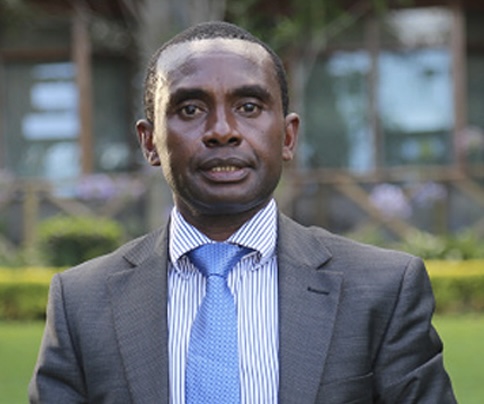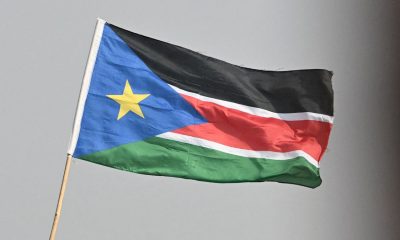News
NIA CEO Charles Muasya and Senior Officials Face EACC Probe Over Alleged Tender Manipulation

A whistleblower complaint has exposed alleged corruption at Kenya’s National Irrigation Authority (NIA), implicating CEO Charles Muasya, Board Chairman Gilbert Maluki, and board member Ubah Kahiye in tender manipulation, bribery, and political interference.
The document, obtained by Kenya Insights, calls for an Ethics and Anti-Corruption Commission (EACC) investigation and asset freezes for the accused officials.
The confidential letter, written by an anonymous NIA insider and addressed to EACC Chairperson David Oginde and CEO Abdi A. Mohamud and copied to State House and The Directorate of Criminal Investigations (DCI) alleges systemic corruption led by Muasya.
The accusations include rigged tenders, kickback schemes involving intermediaries, and claims of improper conduct within the authority.
The whistleblower alleges that Muasya operates under the influence of political cartels, with politicians dictating tender awards to associates, bypassing merit-based procurement processes.
Alleged Corrupt Practices
The whistleblower details several irrigation project tenders allegedly awarded through corrupt negotiations, including the Ketut Mokoro, Ugot Mangea, Lant Escarpment Belt, Ambatiest, Adich Gorge Dam, and Nyamaia Irrigation Projects.
Two ongoing tenders for the Athi Dam Project in Kitui and Taita Taveta counties are also flagged as potentially compromised.
The letter claims that public advertisements for these tenders are formalities, with outcomes predetermined in private negotiations.
The document accuses Muasya of operating a bribery scheme using intermediaries to collect kickbacks and secure contracts.
The report also references alleged misconduct within the authority, raising serious ethical and legal concerns about the abuse of power.
Leadership Accusations
Board Chairman Gilbert Maluki is accused of colluding with Muasya to manipulate board decisions for personal gain, while board member Ubah Kahiye is alleged to have pressured procurement staff to favor certain business interests.
The whistleblower claims these actions reflect favoritism that undermines fair competition and erodes trust in NIA operations.
The letter names several officials allegedly involved in facilitating irregular tenders and financial misconduct, including Corporate Secretary Jyanne Okello, Deputy Director Finance Jedidida Obueni, Internal Auditor Dan Opyye, Assistant Director Supply Chain Evelyn Akoth, and Director Irrigation Management Loise Kahiga.
Meanwhile, officials described as ethical, including Deputy General Manager Daniel Atula, Director Irrigation Jairus Serende, Deputy Director Joseph Kiragu, and Director Florence Ndal, are said to have been sidelined for resisting corrupt directives.
Call for Investigation
The whistleblower demands swift EACC action, including a forensic audit of all 2024–2025 tender processes, investigation of bank accounts and financial transactions of Muasya, Maluki, and Kahiye, and preservation of tender documentation.
The letter calls for immediate asset freezes to prevent dissipation of allegedly ill-gotten wealth and urges protection for procurement staff who may testify.
Citing violations of the Public Procurement and Asset Management Act, Leadership and Integrity Act, Anti-Corruption and Economic Crimes Act, and Public Officer Ethics Act, the whistleblower emphasizes the severity of the allegations.
“The corruption at NIA represents not only a betrayal of public resources but also the livelihoods of farmers and communities dependent on these projects,” the letter states, highlighting irrigation’s critical role in Kenya’s food security and economic development.
The allegations emerge as Kenya confronts widespread corruption scandals, with the EACC already investigating high-profile cases involving institutions like the National Treasury and Nakuru Water and Sanitation Services Company.
The NIA scandal, if substantiated, could significantly impact agricultural projects vital to millions of Kenyans.
Social media posts have echoed concerns about Muasya’s leadership, with users alleging tender irregularities at NIA. While these claims remain unverified, they reflect growing public concern about the authority’s operations.
Protection for Whistleblowers
The whistleblower’s request for anonymity and protection under the Whistleblower Protection Act highlights risks faced by those exposing corruption within powerful institutions.
The letter concludes: “I urge the EACC to treat this matter with the urgency it deserves and to take immediate action to stop ongoing corrupt practices while conducting a thorough investigation.”
As Kenya works to restore integrity in public institutions, attention now focuses on the EACC to investigate these allegations and hold those responsible accountable. Kenya Insights will continue following this developing story.
Untitled documentHave information on corruption at NIA or other public institutions? Contact Kenya Insights anonymously at [email protected] or reach out to the EACC at [email protected].
Kenya Insights allows guest blogging, if you want to be published on Kenya’s most authoritative and accurate blog, have an expose, news TIPS, story angles, human interest stories, drop us an email on [email protected] or via Telegram
-

 Business2 days ago
Business2 days agoKakuzi Investors Face Massive Loss as Land Commission Drops Bombshell Order to Surrender Quarter of Productive Estate
-

 Politics2 weeks ago
Politics2 weeks agoODM Shuts Door on Gachagua Alliance, Signals Long-Term Deal with Ruto Ahead of 2027
-

 Politics2 weeks ago
Politics2 weeks agoUhuru Kenyatta Draws Battle Lines in Mt. Kenya Politics Defends Gachagua and Warns Jubilee Rebels to Toe the Line
-

 News2 weeks ago
News2 weeks agoBusinessman Adan Haji Isaack on Spot for Allegedly Harassing City Professor Over Disputed Land
-

 Investigations1 week ago
Investigations1 week agoPeter Agoro Legal Battles Reveal How EACC Framed a Whistleblower to Protect Corrupt Elites
-

 News2 weeks ago
News2 weeks agoKenyan Activists Bob Njagi and Nicholas Oyoo Released After 38 Days in Ugandan Custody
-

 Investigations2 weeks ago
Investigations2 weeks agoEXCLUSIVE: The $1.7 Billion Oil Heist That’s Starving South Sudan While Elites Feast on Blood Money
-

 Politics1 week ago
Politics1 week agoRuto Set to Dominate ODM@20 in Mombasa, Positioning Himself as Raila Odinga’s Political Heir Ahead of 2027





















